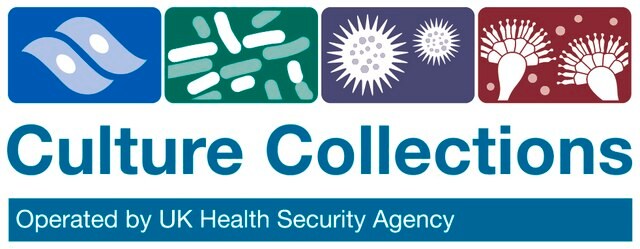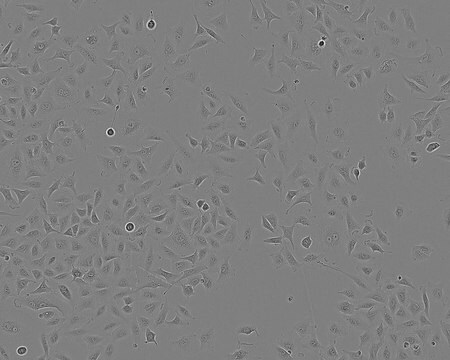93052608
COLO 699 N
Autenticatiper visualizzare i prezzi riservati alla tua organizzazione & contrattuali
About This Item
Codice UNSPSC:
41106514
Prodotti consigliati
Origine biologica
human lymph
Forma fisica
liquid
Modalità di accrescimento
Adherent
Cariotipo
Not specified
Morfologia
Epithelial
Prodotti
Not specified
Recettori
Not specified
tecniche
cell culture | mammalian: suitable
Malattie correlate
cancer
Condizioni di spedizione
dry ice
Temperatura di conservazione
−196°C
Descrizione generale
COLO 699 N cells, a non-small cell lung cancer cell line is useful in subcutaneous xenografts studies to mimic in vivo model of human lung cancer. It finds applications in stable isotope-based proteome analysis.
Origine della linea cellulare
Human lung cancer
Descrizione della linea cellulare
Derived from the pleural fluid of a 57 year old female with lung cancer. Please note: This cell line was found to be indistinguishable from cell lines RPMI 7932 & COLO 738 by STR PCR DNA profiling. At ECACC the STR PCR profile of all stocks of this cell line match the profile of the original source material received at ECACC. However, it is not clear if the cell lines COLO 699N, RPMI 7932 & COLO 738 were originally derived from the same individual as the profiles suggest. The cell lines COLO 699N, RPMI 7932 & COLO 738 were received from the same depositor. If we are able to obtain clarification of the relationship between these cell lines this information will be updated.
Applicazioni
COLO 699 N has been used in cytotoxicity studies with Tegaran and 13-methyltetradecanoic acid (13-MTD).
Tumourigenicity studies
Profilo DNA
STR-PCR Data: Amelogenin: X
CSF1PO: 10
D13S317: 11
D16S539: 12
D5S818: 11,12
D7S820: 11,13
THO1: 9,9.3
TPOX: 8
vWA: 17
CSF1PO: 10
D13S317: 11
D16S539: 12
D5S818: 11,12
D7S820: 11,13
THO1: 9,9.3
TPOX: 8
vWA: 17
Terreno di coltura
RPMI 1640 + 2mM Glutamine + 10% Foetal Bovine Serum (FBS).
Mantenimento delle subcolture
Split sub-confluent cultures (70-80%) 1:3 to 1:6 i.e. seeding at 2-4x10,000 cells/cm2using 0.25% trypsin/EDTA; 5% CO2; 37°C.
Altre note
Additional freight & handling charges may be applicable for Asia-Pacific shipments. Please check with your local Customer Service representative for more information.
Esclusione di responsabilità
RESEARCH USE ONLY. This product is regulated in France when intended to be used for scientific purposes, including for import and export activities (Article L 1211-1 paragraph 2 of the Public Health Code). The purchaser (i.e. enduser) is required to obtain an import authorization from the France Ministry of Research referred in the Article L1245-5-1 II. of Public Health Code. By ordering this product, you are confirming that you have obtained the proper import authorization.
Codice della classe di stoccaggio
10 - Combustible liquids
Classe di pericolosità dell'acqua (WGK)
WGK 3
Punto d’infiammabilità (°F)
Not applicable
Punto d’infiammabilità (°C)
Not applicable
Certificati d'analisi (COA)
Cerca il Certificati d'analisi (COA) digitando il numero di lotto/batch corrispondente. I numeri di lotto o di batch sono stampati sull'etichetta dei prodotti dopo la parola ‘Lotto’ o ‘Batch’.
Possiedi già questo prodotto?
I documenti relativi ai prodotti acquistati recentemente sono disponibili nell’Archivio dei documenti.
Kathrin Grundner-Culemann et al.
Journal of proteomics, 130, 1-10 (2015-09-13)
Non-small cell lung cancer (NSCLC) cell lines are widely used model systems to study molecular aspects of lung cancer. Comparative and in-depth proteome expression data across many NSCLC cell lines has not been generated yet, but would be of utility
H G Morse et al.
Cancer genetics and cytogenetics, 69(2), 108-112 (1993-09-01)
Melanoma cell lines initiated from metastases excised at the same time from multiple sites in a patient reflect a single clone origin. The similarities of the karyotypes of these lines depend upon the site of excision, the selective survival in
Il team dei nostri ricercatori vanta grande esperienza in tutte le aree della ricerca quali Life Science, scienza dei materiali, sintesi chimica, cromatografia, discipline analitiche, ecc..
Contatta l'Assistenza Tecnica.


